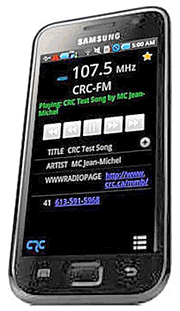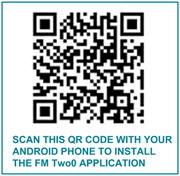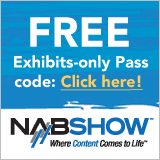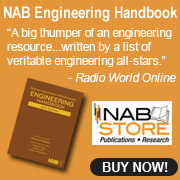
|
Android App for Smartphone Enables FM, RDS The popular
Samsung
Galaxy S class of Android smart phones is an example of a cell
phone device which includes, but does not make use of, an “FM
chip” that would allow for FM radio reception. An impressive
list of features for these phones does not include FM radio, however
the FM chip is there, unutilized. That is, until recently, when
the Communications Research Center Canada (CRC,
Ottawa, On.) announced the release of the FM TwoO (“FM two-oh”)
radio and RDS application for Android. CRC believes that this is
the first independent FM-RDS application for Android mobile phones
available through the Android Market. According to CRC, the FM TwoO
app currently runs on the Samsung Galaxy S mobile phone and similar
models. CRC determined that Samsung Galaxy S devices use the Silicon Lab Si4709FM-RDS receiver chipset and was able to figure out how to access the FM radio chipset on that specific device. FM TwoO uses the CRC FM-RDS Android Library to access the embedded SiLabs FM receiver. This library is available free of charge to third party developers, and is built from two components. The first one is an application program interface (API) that supports the driver of the SiLabs Si4709 FM receiver (ultimately, the CRC hopes to make this technology available across other mobile phone platforms). The API is used to control the receiver and to start/stop the playback of audio. CRC believes that, unfortunately, the SiLabs chip set is not very common on Android devices and to their knowledge, only the Samsung Galaxy S has this chipset. The second component of the library is the API that provides FM-RDS decoding functionality. At the moment, the library can decode the PI code, the PS name and the RadioText fields. The RDS data is available as soon as the FM radio receiver is launched. To support devices that don't have an embedded FM receiver, the API features a "testing mode" which decodes raw RDS data received through Wi-Fi. The corresponding RDS fields will be displayed as soon as they become available. FM TwoO can
be tuned to any station manually or by seeking through usual FM
frequency bands. RDS data is displayed on the main screen of the
application as soon as the radio is in playing mode, as shown in
the image above. Currently, FM TwoO decodes and presents the basic
data fields: program identification (PI), program service (PS) and
Radio Text (RT). In addition to that, FM TwoO supports the more
advanced RT+ Open Data Applications (ODA), where available. RT+
can carry additional data services associated (or not) with the
audio program. For more information,
please visit the corresponding section on the CRC project website.
The CRC FM-RDS Android Library may be accessed directly. A conference session on the topic of radio in cell phones is being held at the NAB Show as part of the Broadcast Management Conference. “Radio-ready Cell Phones: Benefitting Consumers and Broadcasters,” starts at 1 p.m. in room N235 of the Las Vegas Convention Center. This panel session, moderated by NAB Senior Director, Advanced Engineering David Layer, is scheduled to feature panelists Jeff Smulyan, chairman and CEO, Emmis Communications Corp., Lane Bruns, vice president of portable products, iBiquity Digital Corporation, and Matt Straeb, executive vice president, Global Security Systems. For additional conference information visit the NAB Show Conference Web page. |
|
Attending
the NAB Broadcast Engineering Conference?
Named one of Newsweek's "Fifty People Who Matter Most on the Internet," Johnson is a social critic and technologist with writings that have influenced the way political campaigns use the Internet, explored cutting-edge ideas in urban planning, and examined the battle against 21st-century terrorism. Much of Johnson's work studies mapping the future, a concept that predicts and explains the real-world impact of emerging trends and cutting-edge developments in science, technology and media. Johnson is currently contributing editor for Wired magazine and monthly columnist for Discover magazine. He is the recent recipient of the Newhouse School's Mirror Awards for his TIME magazine cover article titled "How Twitter Will Change the Way We Live," and has previously written for The New York Times, The Wall Street Journal and The Nation. An engaging and informative lecturer, Johnson was the 2009 Hearst New Media Professional-in-Residence at Columbia University's Journalism School, where he lectured widely on technological, scientific and cultural issues. Johnson has co-created three influential websites: the pioneering online magazine FEED, the Webby-Award-winning community site, Plastic.com, and most recently the hyperlocal media site outside.in. He has appeared on many television programs, including "The Charlie Rose Show," "The Daily Show with Jon Stewart," and "The NewsHour" with Jim Lehrer. You can also check his recent presentations out on youtube. The NAB Technology
Luncheon will also feature the presentation of the NAB Engineering
Achievement Awards to Thomas B. Keller, T. Keller Corporation
and L. Robert du Treil, du Treil, Lundin and Rackley and the Technology
Innovation Award honoring organizations that bring advanced technology
exhibits and demonstrations of significant merit to the NAB Show.
The NAB Best Paper Award, established in 2010, will also be presented IEEE Broadcast Technology Society Issues Call for Papers 
A Call for Papers has been issued for the 2011 IEEE Broadcast Symposium, to be held October 19-21, 2011, in Alexandria, Va. The Symposium Committee seeks timely and relevant technical papers relating to all aspects of broadcast technology, in particular on the following topics:
The submission
deadline for abstracts is May 1, 2011. There is additional information
on the Symposium on the IEEE
Broadcast Technology Society website.
The March 14, 2011 Radio TechCheck is also available in an Adobe Acrobat file. Please click here to read the Adobe Acrobat version of Radio TechCheck. |



 Three-time
national bestselling author, celebrated lecturer and technologist
Steven Berlin Johnson will speak at the NAB Show Technology Luncheon
on Wednesday, April 13 in the Las Vegas Hilton. Johnson's address
will focus on the origins of ideas that lead to groundbreaking
innovations, a key component of his latest book, Where Good
Ideas Come From: The Natural History of Innovation. (View
related media here.)
Three-time
national bestselling author, celebrated lecturer and technologist
Steven Berlin Johnson will speak at the NAB Show Technology Luncheon
on Wednesday, April 13 in the Las Vegas Hilton. Johnson's address
will focus on the origins of ideas that lead to groundbreaking
innovations, a key component of his latest book, Where Good
Ideas Come From: The Natural History of Innovation. (View
related media here.)

